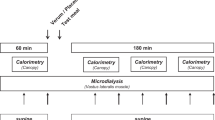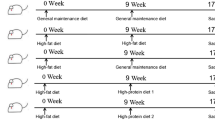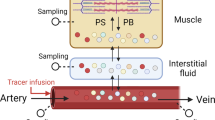Abstract
To determine whole-body protein turnover responses to high-protein diets during weight loss, 39 adults (age, 21±1 years; VO2peak, 48±1 ml kg−1 min−1; body mass index, 25±1 kg m2) were randomized to diets providing protein at the recommend dietary allowance (RDA), 2 × -RDA or 3 × -RDA. A 10-day weight maintenance period preceded a 21-day, 40% energy deficit. Postabsorptive (FASTED) and postprandial (FED) whole-body protein turnover was determined during weight maintenance (day 10) and energy deficit (day 31) using [1-13C]leucine. FASTED flux, synthesis and breakdown were lower (P<0.05) for energy deficit than weight maintenance. Protein flux and synthesis were higher (P<0.05) for FED than FASTED. Feeding attenuated (P<0.05) breakdown during weight maintenance but not energy deficit. Oxidation increased (P<0.05) between dietary protein levels and feeding stimulated oxidation, although oxidative responses to feeding were higher (P<0.05) for energy deficit than weight maintenance. FASTED net balance decreased between dietary protein levels, but in the FED state, net balance was lower for 3 × -RDA as compared with RDA and 2 × -RDA (diet-by-state, P<0.05). Consuming dietary protein at levels above the RDA, particularly 3 × -RDA, during short-term weight loss increases protein oxidation with concomitant reductions in net protein balance.
This is a preview of subscription content, access via your institution
Access options
Subscribe to this journal
Receive 12 print issues and online access
$259.00 per year
only $21.58 per issue
Buy this article
- Purchase on Springer Link
- Instant access to full article PDF
Prices may be subject to local taxes which are calculated during checkout

Similar content being viewed by others
References
Todd KS, Butterfield GE, Calloway DH . Nitrogen balance in men with adequate and deficient energy intake at three levels of work. J Nutr 1984; 114: 2107–2118.
Knapik J, Meredith C, Jones B, Fielding R, Young V, Evans W . Leucine metabolism during fasting and exercise. J Appl Physiol 1991; 70: 43–47.
Tsalikian E, Howard C, Gerich JE, Haymond MW . Increased leucine flux in short-term fasted human subjects: evidence for increased proteolysis. Am J Physiol 1984; 247 (Part 1): E323–E327.
Stein TP, Rumpler WV, Leskiw MJ, Schluter MD, Staples R, Bodwell CE . Effect of reduced dietary intake on energy expenditure, protein turnover, and glucose cycling in man. Metabolism 1991; 40: 478–483.
Gaine PC, Pikosky MA, Martin WF, Bolster DR, Maresh CM, Rodriguez NR . Level of dietary protein impacts whole body protein turnover in trained males at rest. Metabolism 2006; 55: 501–507.
Farnsworth E, Luscombe ND, Noakes M, Wittert G, Argyiou E, Clifton PM . Effect of a high-protein, energy-restricted diet on body composition, glycemic control, and lipid concentrations in overweight and obese hyperinsulinemic men and women. Am J Clin Nutr 2003; 78: 31–39.
Gardner CD, Kiazand A, Alhassan S, Kim S, Stafford RS, Balise RR et al. Comparison of the Atkins, Zone, Ornish, and LEARN diets for change in weight and related risk factors among overweight premenopausal women: the A TO Z Weight Loss Study: a randomized trial. JAMA 2007; 297: 969–977.
Skov AR, Toubro S, Ronn B, Holm L, Astrup A . Randomized trial on protein vs carbohydrate in ad libitum fat reduced diet for the treatment of obesity. Int J Obes Relat Metab Disord 1999; 23: 528–536.
Layman DK, Erickson DJ, Painter JE, Boileau RA, Shiue H, Sather C et al. A reduced ratio of dietary carbohydrate to protein improves body composition and blood lipid profiles during weight loss in adult women. J Nutr 2003; 133: 411–417.
Gougeon R, Hoffer LJ, Pencharz PB, Marliss EB . Protein metabolism in obese subjects during a very-low-energy diet. Am J Clin Nutr 1992; 56 (Suppl): 249S–254S.
Hoffer LJ, Bistrian BR, Young VR, Blackburn GL, Matthews DE . Metabolic effects of very low calorie weight reduction diets. J Clin Invest 1984; 73: 750–758.
Hoffer LJ, Forse RA . Protein metabolic effects of a prolonged fast and hypocaloric refeeding. Am J Physiol 1990; 258 (Part 1): E832–E840.
Pasiakos SM, Cao JJ, Margolis LM, Sauter ER, Whigham LD, McClung JP et al. Effects of high-protein diets on fat-free mass and muscle protein synthesis following weight loss: a randomized controlled trial. FASEB J 2013; 27: 3837–3847.
Carbone JW, Margolis LM, McClung JP, Cao JJ, Murphy NE, Sauter ER et al. Effects of energy deficit, dietary protein, and feeding on intracellular regulators of skeletal muscle proteolysis. FASEB J 2013. e-pub ahead of print 21 August 2013.
Rennie MJ, Tipton KD . Protein and amino acid metabolism during and after exercise and the effects of nutrition. Annu Rev Nutr 2000; 20: 457–483.
Matthews DE, Motil KJ, Rohrbaugh DK, Burke JF, Young VR, Bier DM . Measurement of leucine metabolism in man from a primed, continuous infusion of L-[1-3C]leucine. Am J Physiol 1980; 238: E473–E479.
Hoerr RA, Yu YM, Wagner DA, Burke JF, Young VR . Recovery of 13C in breath from NaH13CO3 infused by gut and vein: effect of feeding. Am J Physiol 1989; 257 (Part 1): E426–E438.
Garlick PJ, McNurlan MA, Ballmer PE . Influence of dietary protein intake on whole-body protein turnover in humans. Diabetes Care 1991; 14: 1189–1198.
Nair KS, Woolf PD, Welle SL, Matthews DE . Leucine, glucose, and energy metabolism after 3 days of fasting in healthy human subjects. Am J Clin Nutr 1987; 46: 557–562.
Yang RD, Matthews DE, Bier DM, Wen ZM, Young VR . Response of alanine metabolism in humans to manipulation of dietary protein and energy intakes. Am J Physiol 1986; 250 (1 Pt 1): E39–E46.
Pikosky MA, Smith TJ, Grediagin A, Castaneda-Sceppa C, Byerley L, Glickman EL et al. Increased protein maintains nitrogen balance during exercise-induced energy deficit. Med Sci Sports Exerc 2008; 40: 505–512.
Friedlander AL, Braun B, Pollack M, MacDonald JR, Fulco CS, Muza SR et al. Three weeks of caloric restriction alters protein metabolism in normal-weight, young men. Am J Physiol Endocrinol Metab 2005; 289: E446–E455.
Phillips SM . Higher protein during an energy deficit: muscle’s guardian and fat’s enemy? Med Sci Sports Exerc 2008; 40: 503–504.
Bolster DR, Pikosky MA, Gaine PC, Martin W, Wolfe RR, Tipton KD et al. Dietary protein intake impacts human skeletal muscle protein fractional synthetic rates after endurance exercise. Am J Physiol Endocrinol Metab 2005; 289: E678–E683.
de Souza RJ, Bray GA, Carey VJ, Hall KD, LeBoff MS, Loria CM et al. Effects of 4 weight-loss diets differing in fat, protein, and carbohydrate on fat mass, lean mass, visceral adipose tissue, and hepatic fat: results from the POUNDS LOST trial. Am J Clin Nutr 2012; 95: 614–625.
Mettler S, Mitchell N, Tipton KD . Increased protein intake reduces lean body mass loss during weight loss in athletes. Med Sci Sports Exerc 2010; 42: 326–337.
Fulgoni VL III . Current protein intake in America: analysis of the National Health and Nutrition Examination Survey, 2003–2004. Am J Clin Nutr 2008; 87: 1554S–1557S.
Brenner BM, Meyer TW, Hostetter TH . Dietary protein intake and the progressive nature of kidney disease: the role of hemodynamically mediated glomerular injury in the pathogenesis of progressive glomerular sclerosis in aging, renal ablation, and intrinsic renal disease. N Engl J Med 1982; 307: 652–659.
King AJ, Levey AS . Dietary protein and renal function. J Am Soc Nephrol 1993; 3: 1723–1737.
Newgard CB, An J, Bain JR, Muehlbauer MJ, Stevens RD, Lien LF et al. A branched-chain amino acid-related metabolic signature that differentiates obese and lean humans and contributes to insulin resistance. Cell Metab 2009; 9: 311–326.
Martin WF, Armstrong LE, Rodriguez NR . Dietary protein intake and renal function. Nutr Metab (Lond) 2005; 2: 25.
Vasdev S, Stuckless J . Antihypertensive effects of dietary protein and its mechanism. Int J Angiol 2010; 19: e7–e20.
Stamler J, Elliott P, Kesteloot H, Nichols R, Claeys G, Dyer AR et al. Inverse relation of dietary protein markers with blood pressure. Findings for 10,020 men and women in the INTERSALT Study. INTERSALT Cooperative Research Group. INTERnational study of SALT and blood pressure. Circulation 1996; 94: 1629–1634.
Dyer A, Elliott P, Chee D, Stamler J . Urinary biochemical markers of dietary intake in the INTERSALT study. Am J Clin Nutr 1997; 65 (4 Suppl): 1246S–1253S.
Acknowledgements
This work was supported by the US Army Medical Research and Material Command and the US Department of Agriculture, Agricultural Research Service, under agreement no. 58-1950-7707.
Author information
Authors and Affiliations
Corresponding author
Ethics declarations
Competing interests
The authors declare no conflict of interest.
Additional information
Disclaimer
The investigators adhered to the policies for protection of human subjects as prescribed in Army Regulation 70-25, and the research was conducted in adherence with the provisions of 32 CFR part 219. The opinions or assertions contained herein are the private views of the authors and are not to be construed as official or as reflecting the views of the Army or the Department of Defense. Any citations of commercial organizations and trade names in this report do not constitute an official Department of the Army endorsement of approval of the products or services of these organizations. Any opinions, findings, conclusion or recommendations expressed in this publication are those of the author(s) and do not necessarily reflect the view of the US Department of Agriculture.
Rights and permissions
About this article
Cite this article
Pasiakos, S., Margolis, L., McClung, J. et al. Whole-body protein turnover response to short-term high-protein diets during weight loss: a randomized controlled trial. Int J Obes 38, 1015–1018 (2014). https://doi.org/10.1038/ijo.2013.197
Received:
Revised:
Accepted:
Published:
Issue Date:
DOI: https://doi.org/10.1038/ijo.2013.197
Keywords
This article is cited by
-
Lean mass sparing in resistance-trained athletes during caloric restriction: the role of resistance training volume
European Journal of Applied Physiology (2022)



